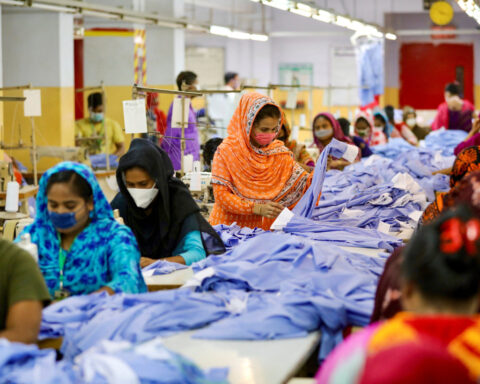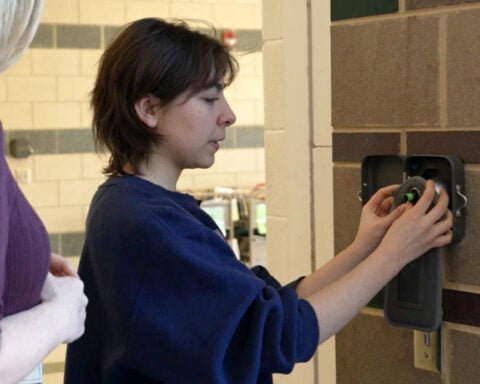Hong Kong (CNN) — A towering 5,000 feet high, with more than 7,000 steps, Mount Tai, in the eastern Chinese province of Shandong, is known for turning legs to jelly for anyone game for scaling to the top.
Videos all over Chinese social media, such as TikTok’s sister app Douyin, show even the fittest hikers shaking, collapsing or trying to climb downhill on all fours.
Some visitors hire “climbing buddies” to help them make the summit.
But tourism officials in Shandong have come up with another idea: robotic legs.
On January 29, the first day of Chinese New Year, ten AI-powered exoskeletons debuted at Mount Tai (Taishan in Mandarin), attracting over 200 users for a fee of 60 yuan to 80 yuan ($8 - $11 USD) per use during a week-long trial, according to Xinhua News Agency.
Co-developed by Taishan Cultural Tourism Group and Kenqing Technology, a Shenzhen-based tech company, this device is designed to wrap around users’ waists and thighs and weighs in at just 1.8 kilograms, according to the firm’s product introduction.
Powered by AI algorithms, it can sense users’ movements and provide “synchronized assistance” to ease the burden of legs, according to Kenqing Technology.
Each robotic exoskeleton runs on two batteries, lasting for about five hours, according to Wang Houzhe, Deputy Secretary of the Party Committee of the Taishan Cultural Tourism Group. It generally takes six hours to climb to the top.
“It really works!” Li Chengde, a 68-year-old tourist from the capital Jinan, told state-run Xinhua News Agency after trying out the device. “It felt like someone was pulling me uphill!”
“This can help more people hike up the mountain and enjoy the scenery of Mount Tai… without it being too strenuous,” Wang told Chinese state media.
Jacky, a content creator from Shandong who requested a pseudonym for privacy reasons, tested the device last Sunday for half an hour over hundreds of steps.
While echoing the general positive feedback as many others, he told CNN there is still room for improvement.
“The experience is definitely easier,” he said about climbing with the device on. “But once I took it off, I felt a bit clumsy walking (on my own).”
The 29-year-old said he felt like a “puppet” with the machine doing all the work but once he got used to not exerting himself, it was “really tiring” after he removed the exoskeleton and went back to climbing of his own power.
Jacky added he also found the device inconvenient when he needed to use the bathroom and tie his shoelaces while wearing it. The exoskeleton requires extra hands to put on and take off and fully squatting down could risk breaking the tight straps.
He also said that the battery needed more juice.
Wang from the Taishan Cultural Tourism Group said the team will extend battery life and set up replacement spots along the hiking trails, according to Chinese state-linked media.
Currently in beta testing, the exoskeletons are expected to hit the mass market in early March, according to the local publicity department.
Despite a few hiccups, Jacky deems the exoskeleton robots a “good product” and a “true blessing” for the elderly, children and mobility-impaired visitors. Half of the hikers who opted to try out the prototype exoskeletons at Mount Tai were senior citizens.
In addition to making mountain climbing a whole lot easier, these walking supports have sparked online discussions about their wider applications in a country grappling with a rapidly ageing population.
Last year, 22% of China’s population was over 60, and that figure is expected to rise to 30% by 2035, with the elderly population surpassing 400 million, according to the Chinese National Bureau of Statistics.
And the market size of smart elderly care in China was estimated at 6.8 trillion yuan (about $934 billion) in 2024, Chinese state broadcaster CCTV reported.
Kenqing Technology, the robotic exoskeletons’ co-developer, which was founded in 2015, is eyeing this vast elderly care market. It has rolled out an exoskeleton specifically designed for elderly users, weighing 2.4 kilograms and priced at 17,000 yuan ($2,334 USD) on China’s e-commerce giant Taobao.
To fully unlock the potential of elderly care robots, industry insiders told Xinhua News Agency that stronger policy support is needed to scale up their production while keeping prices affordable for all.
The-CNN-Wire
™ & © 2025 Cable News Network, Inc., a Warner Bros. Discovery Company. All rights reserved.

 Trump has begun another trade war. Here's a timeline of how we got here
Trump has begun another trade war. Here's a timeline of how we got here
 Canada's leader laments lost friendship with US in town that sheltered stranded Americans after 9/11
Canada's leader laments lost friendship with US in town that sheltered stranded Americans after 9/11
 Chinese EV giant BYD's fourth-quarter profit leaps 73%
Chinese EV giant BYD's fourth-quarter profit leaps 73%
 You're an American in another land? Prepare to talk about the why and how of Trump 2.0
You're an American in another land? Prepare to talk about the why and how of Trump 2.0
 Chalk talk: Star power, top teams and No. 5 seeds headline the women's March Madness Sweet 16
Chalk talk: Star power, top teams and No. 5 seeds headline the women's March Madness Sweet 16
 Purdue returns to Sweet 16 with 76-62 win over McNeese in March Madness
Purdue returns to Sweet 16 with 76-62 win over McNeese in March Madness








